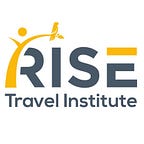Regenerative International Education and What Needs to Change
International education through international exchange or study abroad programs offers the student a chance to gain new cultural experiences directly from travel. The guided nature of these programs connect students with local communities and foster educational opportunities that they would not otherwise have access to in normal travel. While many students have the opportunity to participate in international education, many underserved students do not have access due to lack of funding and other barriers.
This International Education Week, we take a look at some of the benefits international education offers as well as some of the problems with current international education systems. RISE Travel Institute’s mission is to inspire responsible, impactful, sustainable and ethical travel through education. International education can be a positive way to partake in regenerative travel for both the student and the local community they are visiting.
Regenerative International Education
Experience through Immersion
International education programs allow students to spend significant time within a new culture, whether for just a summer or a full semester or a year abroad. Time enables students to absorb parts of the culture that only direct experience can provide. With that time students can develop language skills, interact with the local community, and see the impact that their travel has.
Connecting with Local Communities
Staying in the dorm of a local university or the home of a local family provides cultural exposure beyond what most travel begins to offer. Even if the program’s host is just composed of student guides, person-to-person contact advances understanding of the local community at an individual level.
The Meeting of International Minds
Many international education programs allow students to meet other students in the program from around the world. This connection broadens the cultural experience even further by introducing people from around the world to both the host nation and each other.
Travel Education
International education provides a travel opportunity in which all parties are ideally beneficial participants. From students, host families, and educational institutions to the local communities they exist in, international education delivers a readymade positive travel experience. Through this travel and the time spent in their host destination, students can learn to apply responsible travel to their own lives.
A study by the University System of Georgia found that study abroad helped with students’ traditional education as well, with study abroad students having a 7.5% higher four-year graduation rate.
What Needs to Change
Access to International Education
The primary source of funding for international education is the individual or their family with 56.2% of international students in the US funding their own journey. As most international education is self-funded, this creates a significant barrier for students who wish to participate but do not have the funds to do so.
To increase access to and equity within travel education, it is essential that funding is made available for underserved students. Right now only 17% of international education in the US is funded by colleges or universities.
Overtourism in Popular Destinations
International education in destinations that are already faced with overtourism can serve to add to the issues already present, such as housing and congestion. 55.7% of international students from the US studied in Europe. To expand the benefit of international education it is essential that programs are spread to more of the world, beyond primarily popular tourist destinations.
Diversity, Equity, and Inclusion
While college enrollment rates have become significantly more racially diverse in the US, 68.7% of international students in 2020 were white while 31.3% were other ethnicities. International education needs to be available and encouraged across ethinic groups.
The Forum on International Education includes in its code of ethics guidance on diversity, equity, and inclusion.
We seek out opportunities to engage with diverse populations and perspectives, and do so with patience, understanding, humility, and respect, modelling the behavior we aim to cultivate in our learners. We endeavor to expand access to education abroad, and to create an environment of inclusivity that is open, respectful, and safe for all. We strive for equity in our treatment of all. We do not accept intolerance, and we work to eliminate inequities within our organizations and communities. (paras. 8)
Also actively working to support and promote Diversity, Equity and Inclusion in Global Education, Diversity Abroad’s mission is to “create equitable access to the benefits of global education by empowering educators, engaging stakeholders, and connecting diverse students to resources and opportunity.”
“Diversity Abroad firmly believes in the power of global education and that access to the benefits such experiences afford is a question of educational equity. Through the development and dissemination of diversity & inclusive good practices for the field of international education and cultural exchange, online and in-person professional development and an innovative student success platform, Diversity Abroad equips individuals and organizations to advance student success and career readiness through equitable access to global educational opportunities.” (paras. 2)
Interested in learning more about responsible, impactful, sustainable and ethical travel? Visit https://www.risetravelinstitute.org/ to learn about our educational programs.
About the Author:
Jay (he/him) is a writer and marketer from New Jersey. With a background in content marketing ranging from digital advertising to B2B thought leadership, he brings extensive copywriting experience to the RISE team. Above all, Jay wishes to have a positive impact on the environment and communities locally and throughout the world.
Outside of advocating for sustainable and ethical tourism, he enjoys hiking, backpacking, plant based cooking and playing guitar. Jay has a BA in English from Rutgers University and is always looking for book recommendations.
